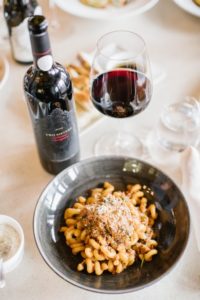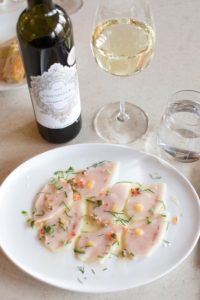Lifestyle and Living
Wine and Dine – Pairing Your Favourite Vintage
Feb 2022 | By Catherine Daley
Is your favourite food and your favourite wine a match made in heaven?
Dionysus, in Greek mythology, is the god of fruitfulness and vegetation – especially known as a god of wine and revelry. In Rome, this god is referred to as Bacchus or Liber Pater. The Egyptians associated several gods with wine as early as 4,000 BCE.
In many cultures the divine origin of wine dates back hundreds of centuries, when gods considered wine as medicine for melancholy and boredom. And, of course, there’s deep symbolism as it relates to the sacrament when Jesus turned water into wine. The water represented all of humanity (human nature itself), while the wine represented Christ.
Humanity still reveres the sacred grape, and continues to develop vintages with various characteristics and compositions. It’s an art form, and collecting treasured bottles is highly regarded.
The power of flavours
 When producing red wine, the winemaker wants the skins to impart more colour. The longer the juice sits with grape skins, seeds and stems after the grapes have been pressed, the stronger the tannins will be. A wine with high tannins is often described as bitter and astringent – pucker power. Tannins can also create a drying sensation in your mouth.
When producing red wine, the winemaker wants the skins to impart more colour. The longer the juice sits with grape skins, seeds and stems after the grapes have been pressed, the stronger the tannins will be. A wine with high tannins is often described as bitter and astringent – pucker power. Tannins can also create a drying sensation in your mouth.
Winemakers also love tannins, because they work as a natural antioxidant to help protect the wine. This is why certain reds, like Cabernet Sauvignon, are age-worthy.
Wine should have the same taste intensity as the food you’re eating. “A deep, full-bodied red is the perfect match with a juicy, well-marbled steak, or a protein with a high fat content,” says Melissa Marotta-Paolicelli, co-proprietor, Two Sisters Vineyards in Niagara on the Lake “The fat then mellows out the tannins, thus releasing more of its fruit nuances.” She also says that you should avoid a wine with a high alcohol content when eating spicy dishes, as the alcohol can negatively elevate the spice.
Lighter intensity foods, such as fish or chicken, are best paired with lighter white wines. And one should make sure the wine is chilled.
 “When enjoying multiple dishes as part of your meal, make sure your wines are moving up in tannins and weight,” says Marotta-Paolicelli. “Start off with a sparkling, then move onto a white or rose, and then on to the reds.”
“When enjoying multiple dishes as part of your meal, make sure your wines are moving up in tannins and weight,” says Marotta-Paolicelli. “Start off with a sparkling, then move onto a white or rose, and then on to the reds.”
Sweet wines work well with spicy food, as well as desserts that are equally (or less) sweet than the wine. “A well-balanced Riesling, with good acidity and some residual sugar, is a beautiful pairing for spicy Thai or Szechuan dishes,” adds Marotta-Paolicelli.
Two Sisters Winery
Sisters and co-proprietors Angela Marotta and Melissa Marotta-Paolicelli opened Two Sisters Vineyards in late 2014. They produce wines of remarkable power, finesse and elegance, and they are also dedicated to sustainable farming practices and low yields. More than 130 acres of vines are carefully tended to in the Niagara River VQA sub appellation.
The Two Sisters Winery is committed to offering guests an experience that encompasses all of the senses. Their onsite restaurant, Kitchen76, has been featured in the OpenTable list of Top 100 Restaurants in Canada, and was awarded the Certificate of Excellence by TripAdvisor for three years in a row. The menu is inspired by the sisters’ southern Italian heritage.
twosistersvineyards.com



